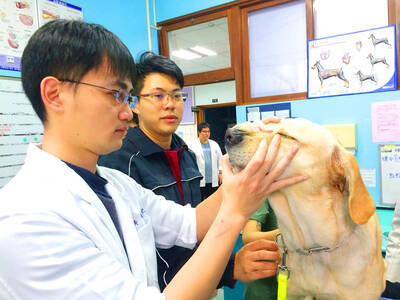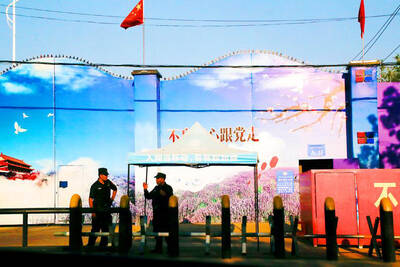Kaohsiung Mayor Han Kuo-yu (韓國瑜), the Chinese Nationalist Party’s (KMT) presidential candidate, yesterday urged people to vote against the “corrupt” Democratic Progressive Party (DPP) in Saturday’s presidential and legislative elections so that Taiwan could gain the respect of other democracies.
“When in power, the DPP always tries to pocket as much as it can, and when elections are near it just bribes media outlets to attack its opponents,” Han told a rally in Keelung.
For the first time in Taiwan’s history, 90 percent of media outlets are only criticizing the opposition parties, instead of keeping the ruling party in check, he said.

Photo: George Tsorng, Taipei Times
“We all know this is an unfair presidential race, as our opponent not only has greater resources, but controls the armed forces as well as cyberarmies,” he said.
Han said that the distribution of resources is “extremely one-sided” between the pan-blue and pan-green camps, and compared running against the DPP to fighting a boxing match against an opponent “armed with an Uzi, a flamethrower, and assisted with satellites and missiles, while having only a nail clipper as a weapon.”
“We do not care how many resources you have — we will just fight you with our eyes closed, because we believe in the people,” he said.
The DPP thinks it can win the elections by having 90 percent of the media outlets attack the KMT’s “dark-skinned, bold, old and ugly presidential candidate,” not realizing it has lost public support, he said.
To put an end to the DPP’s corrupt rule, Taiwanese must vote it out of power, he said.
Doing so would show “all free and democratic countries around the world that Taiwanese can think clearly” and “make them gain respect for us,” he said.
Later yesterday, at a rally in Yilan County with KMT legislative candidate Lu Guo-hwa (呂國華), Han said that, if elected president, he would adopt a series of outward-looking policies that “open up Taiwan to the world.”
As president, he would promote scholarships to fund university students who want to study abroad for a year and encourage foreign universities to establish branches in Taiwan, Han said.
He would also provide scholarships for government employees, including military personnel, public-school teachers and public servants, to study abroad, he said.
Moreover, he said he would launch a Chinese-English bilingual program for all first-grade elementary students and the largest-scale talent fostering program in the nation’s history.

Former Czech Republic-based Taiwanese researcher Cheng Yu-chin (鄭宇欽) has been sentenced to seven years in prison on espionage-related charges, China’s Ministry of State Security announced yesterday. China said Cheng was a spy for Taiwan who “masqueraded as a professor” and that he was previously an assistant to former Cabinet secretary-general Cho Jung-tai (卓榮泰). President-elect William Lai (賴清德) on Wednesday last week announced Cho would be his premier when Lai is inaugurated next month. Today is China’s “National Security Education Day.” The Chinese ministry yesterday released a video online showing arrests over the past 10 years of people alleged to be

THE HAWAII FACTOR: While a 1965 opinion said an attack on Hawaii would not trigger Article 5, the text of the treaty suggests the state is covered, the report says NATO could be drawn into a conflict in the Taiwan Strait if Chinese forces attacked the US mainland or Hawaii, a NATO Defense College report published on Monday says. The report, written by James Lee, an assistant research fellow at Academia Sinica’s Institute of European and American Studies, states that under certain conditions a Taiwan contingency could trigger Article 5 of NATO, under which an attack against any member of the alliance is considered an attack against all members, necessitating a response. Article 6 of the North Atlantic Treaty specifies that an armed attack in the territory of any member in Europe,

LIKE FAMILY: People now treat dogs and cats as family members. They receive the same medical treatments and tests as humans do, a veterinary association official said The number of pet dogs and cats in Taiwan has officially outnumbered the number of human newborns last year, data from the Ministry of Agriculture’s pet registration information system showed. As of last year, Taiwan had 94,544 registered pet dogs and 137,652 pet cats, the data showed. By contrast, 135,571 babies were born last year. Demand for medical care for pet animals has also risen. As of Feb. 29, there were 5,773 veterinarians in Taiwan, 3,993 of whom were for pet animals, statistics from the Animal and Plant Health Inspection Agency showed. In 2022, the nation had 3,077 pediatricians. As of last

XINJIANG: Officials are conducting a report into amending an existing law or to enact a special law to prohibit goods using forced labor Taiwan is mulling an amendment prohibiting the importation of goods using forced labor, similar to the Uyghur Forced Labor Prevention Act (UFLPA) passed by the US Congress in 2021 that imposed limits on goods produced using forced labor in China’s Xinjiang region. A government official who wished to remain anonymous said yesterday that as the US customs law explicitly prohibits the importation of goods made using forced labor, in 2021 it passed the specialized UFLPA to limit the importation of cotton and other goods from China’s Xinjiang Uyghur region. Taiwan does not have the legal basis to prohibit the importation of goods